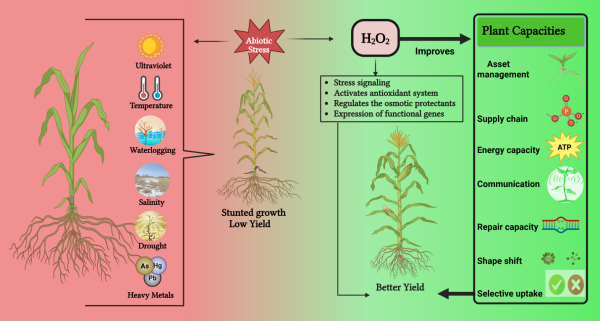
A recent literature review has shed new light on hydrogen peroxide (H₂O₂) as a powerful tool for enhancing crop resilience against climate-driven abiotic stresses, offering a promising pathway to enhance crop resilience without genetic modification.
The review was published in Physiologia Plantarum.
In this review, researchers led by Prof. CHEN Yaning from the Xinjiang Institute of Ecology and Geography (XIEG) of the Chinese Academy of Sciences addressed a critical gap in sustainable agriculture by exploring how H₂O₂ can naturally enhance plant stress tolerance. They demonstrated how this naturally occurring molecule can be used to help crops withstand the mounting pressures of climate change.
Abiotic stresses account for approximately 50% of global crop yield losses. Thus, the researchers examined existing research on the mechanisms of H₂O₂ under various stress conditions including drought, salinity, heavy metals, temperature extremes, waterlogging, and ultraviolet radiation, all increasingly problematic due to climate change.
The review consolidates evidence showing that H₂O₂ serves multiple functions in coordinating stress resilience, influencing energy management, hormonal signaling, resource optimization, and metabolic processes. This perspective reframes H₂O₂ as not only an antioxidant enhancer, but also a versatile messenger that coordinates stress responses, protects photosynthetic machinery, and optimizes the source-sink balance to ensure efficient carbon allocation for improved yield under stress conditions.
"Unlike traditional approaches that focus on genetic modification or external inputs, H₂O₂-mediated strategies could offer environmentally friendly alternatives that work with plants' natural defense mechanisms rather than requiring genetic modification," said Hassan Iqbal, first author of the study.
A critical insight from the review is the importance of dosage. At low to moderate concentrations, H₂O₂ acts as a protective "priming" agent that triggers beneficial stress responses. However, the authors caution that high concentrations (e.g., above 80 mM in soil) can be harmful, underscoring the need for precise application protocols.
The researchers identified several promising applications, including the development of H₂O₂-based treatments that can be applied directly to crops facing environmental stress. These interventions could provide farmers with cost-effective, environmentally friendly tools to protect yields while maintaining crop quality under challenging conditions.
"As agricultural systems face increasing environmental pressures, exploring innovative solutions that utilize plants' existing capabilities becomes increasingly important," said Prof. CHEN yaning, corresponding author of the study.
The review establishes a basis for future research into translating current scientific understanding into practical agricultural applications, and suggests that H₂O₂-based strategies warrant further investigation as potential components of climate-smart agricultural practices.

How hydrogen peroxide application primes plants to withstand environmental stressor. (Image by XIEG)

86-10-68597521 (day)
86-10-68597289 (night)

52 Sanlihe Rd., Xicheng District,
Beijing, China (100864)

